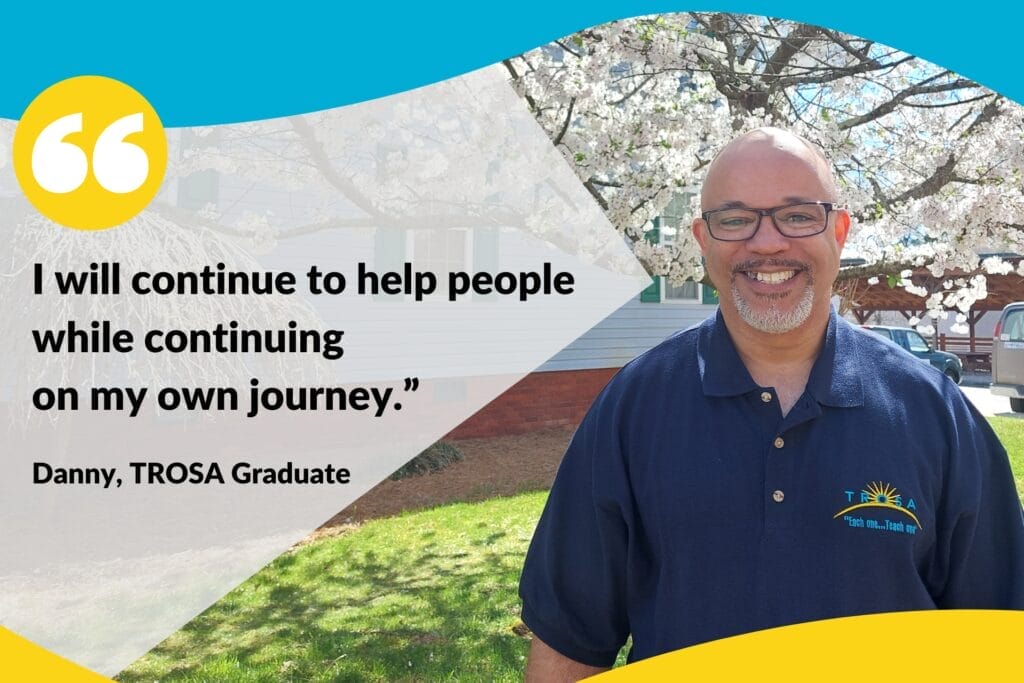“I care about people,” shares TROSA graduate Danny. “I get to give back by interacting with the newer residents in the program. When I hear or see that someone may feel alone; I’m their biggest cheerleader. I’m going to do whatever it takes so that person doesn’t feel like how I felt during most of my lifetime.”
Danny spent decades in a cycle of addiction and incarceration. He started TROSA’s multi-year residential treatment program in 2019.
“My mother and my sister were hurting,” he shares. “My mother said to me one day: ‘I didn’t realize my golden years were going to be so stressful’. A day or so later they put TROSA’s number on my nightstand.”
As a young child, Danny grew up in Germany and Virginia. “My father was a military guy. That gave us an opportunity to travel a bit.”
Danny’s family moved to Durham in 1976. Durham was different from his childhood on the global military bases. “I was really having trouble finding my way,” he shares. “I was already bottled up by a lot of fear and anxiety. I was having trouble connecting to people. Issues like race were pointed out to me a lot more here. I acted and talked differently. I felt like I wasn’t welcomed by any group.”
Attempting to cope with the emotional and mental challenges of connecting with others, Danny turned to drugs. His behaviors and actions centered around his addiction. He first went to jail at age sixteen.
Danny accumulated more than twenty-five years of incarceration. Through it all, he was always searching for connection, and was drawn to a community-based and peer-driven treatment model.
“For so long, I was just trying to survive. I haven’t been able to have close relationships with people and to share the full spectrum of my emotions. I’ve just had to survive; but those are not good tools for a productive life. Even when I was incarcerated, I’ve looked to counselors… anyone who might help me and have a good listening ear.
“When I learned about the importance of TROSA’s program’s structure–having a community–that was very attractive to me. It was hard to form that type of connection in my own family, but I always knew it’s important to talk through things.”
When he first arrived at TROSA, Danny wasn’t entirely sure of trusting others. Through interactions with fellow TROSA residents and staff mentors, he started to make meaningful changes.
As part of a full comprehensive range of activities and services, TROSA residents participate in community assignments that play a key therapeutic role in their program. Within community assignments, residents have the opportunity to practice living in recovery with others. Danny’s community assignment at TROSA Thrift Store has been especially helpful.
At TROSA Thrift Store, Danny is a donation and dispatch coordinator, and that gives him the opportunity to learn and practice his communication skills.
“I’m so thankful for my supervisors at the Thrift Store. I’ve learned so many lessons here. I’m learning how to communicate better with those around me and how to set boundaries with people.” Danny has also reinforced his strengths in customer service, which is a source of confidence and pride. “That’s something we are lacking in addiction,” he shares. “Feeling good about ourselves.”
Through TROSA’s peer-based model, Danny has been empowered by others in recovery to take on leadership roles and learn new strengths.
“At first, I didn’t volunteer for anything at TROSA. My ‘normal’ was just to watch, observe, blend in, and not make any waves around me. I’m very good at that. I have a habit of physically removing myself from uncomfortable situations.
“At about 6 months at TROSA, I was asked by a senior resident if I wanted to step up into a team leadership role. I was told it would be good for my confidence…and that got my attention. I started to interact more and I listened to feedback from those around me.”
Danny takes advantage of many therapeutic classes and activities at TROSA. He works with a counselor to address emotions, thoughts, and behaviors that result from traumatic memories.
He is also taking the time to cultivate his talents for music, and to enjoy the world around him.
“I am finally learning how to live in my city,” he shares. “I went to a Durham Bulls game for the first time at TROSA. I’ve been to Duke games…I go to Cole Mill Trail…things that are special to Durham that I had never done before; despite living here for decades. And there’s so much more growth to take place…so much more that I can experience.”
Designed as a two-year program, residents that are approaching their graduation date can elect to stay longer in the program to continue working towards their therapeutic and professional goals. Danny graduated from TROSA in 2021 and applied to stay longer in the program as a senior resident. He was recently accepted into TROSA’s Staff-in-Training program and is training to become a staff member.
“I have skills I want to further develop, like patience and better listening skills. Watching others grow as I’m growing…finding ways to interact with different people and different personalities…has been a joy. I will continue to help people while continuing on my own journey.”

